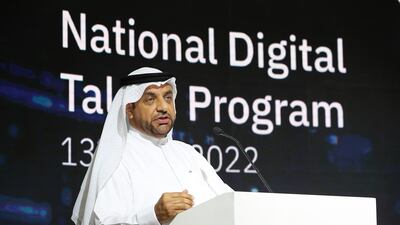Flexible hours and remote working conditions will attract more young Emiratis to join the private sector, a senior banking executive said on Wednesday.
Abdulla Qassem, group chief operating officer with Emirates NBD, said one of the main hurdles to enticing Emiratis from the public sector was the perception of longer working hours and inflexibility - but that's changing.
The success of remote working has seen the many firms continue to offer a hybrid working model, with staff in the office for part of the week and operating from home for the remainder.
“I would say the biggest challenge we have in attracting Emiratis to work in the private sector is the working hours,” Mr Qassem told The National.
Emirates NBD
“However, one thing the private sector has done well recently is in offering more flexibility to work remotely.
“That’s making private companies more appealing. Another factor is there are many opportunities for promotions and advancement in the private sector.”
Flexible working is seen as a major factor in attracting and retaining talent. In May, tech firm Cisco found 61 per cent of UAE professionals would be less likely to look for a new job if they could split their work between the office and home.
Skills to match needs
Mr Qassem was speaking on the sidelines of the launch of the National Digital Talent Programme at Dubai’s Museum of the Future.
The scheme aims to help Emirati interns over the next four years to be versed in future technologies, to bolster the UAE’s National Strategy for Artificial Intelligence.
The goal of the project is to create a generation of Emiratis who are skilled in AI-related technologies.
“The number of Emiratis working in the private sector is still comparatively low,” said Mr Qassem.
_______________________________________
What an Emirati should earn in the private sector: scroll through the slides
_______________________________________
“But schemes like this one will help encourage Emiratis to look at jobs outside the public sector and bridge those gaps.”
The programme will see a number of Emirati students taking up paid internship positions with Emirates NBD and work in the bank’s digital and IT departments.
Finding talent with the necessary skills to adapt to the ever-evolving technology used in artificial intelligence is a common challenge, one not just confined to the UAE, Mr Qassem said.
“Finding digital talent that meets a company’s needs is a global challenge, it’s not just a UAE-specific problem,” he said.
“There will be a lot of collaborations between organisations and universities to make sure graduates have the skills to match a company’s needs by the time they enter the workplace.”
The UAE government launched a major recruitment drive in 2020 to ensure at least 10 per cent of the private workforce was Emirati by 2026.
The Nafis programme was created with the goal of helping 75,000 Emiratis to join the private sector.
Enabled by technology

Speaking at the same event, Omar Al Olama, Minister of State for Digital Economy, AI and Remote Work Applications, said technology is changing many well-established industries.
“We have seen throughout the years that certain sectors have been completely transformed because of technology,” he said.
“Sectors like aviation, automobiles and transport are becoming technology-driven.”
Rather than being replaced by the increased use of artificial intelligence, he said workers will be empowered by advancements in technology.
“We do not believe in the UAE that humans are going to be replaced by technology,” he said.
“What we do believe is that humans are going to find themselves enabled by technology to create the future we want to live in,” Mr Al Olama said.
He said the UAE government is striving to develop talented citizens by enabling them to learn and train with leading companies, to enhance their ability to work and lead various sectors and raise the level of the nation’s digital economy.

















